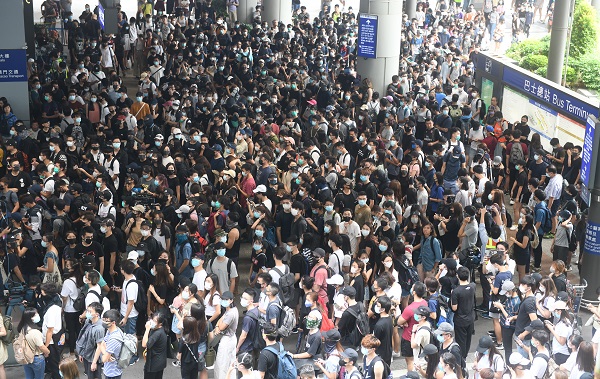
Hong Kong, The Hong Kong police said they arrested 159 people between Friday and Sunday, marking the highest number of those detained over a weekend since the anti-government protest movement began in June.
The total number of arrests related to the ongoing civil movement, which has plunged Hong Kong into its worst political crisis in decades, now sits at 1,117.
Those arrested over the weekend included 132 males and 27 females aged 13 to 58, said Chief Superintendent John Tse Chun-chung of the Hong Kong Police’s public relations bureau during a daily press briefing on Monday, Efe news reported.
They were arrested on charges such unlawful assembly, possession of offensive weapons and assaulting and obstructing police. Sixteen of them — aged between 18 and 42 — were charged with rioting on August 31.
Another eight were arrested on Monday over charges of possession of offensive weapons and breaching a court injunction order.
The 159 also included two prominent young activists, four pro-democracy lawmakers and an ex-President of a university student union, who were taken away by the police from various locations on August 30.
They were arrested on charges such as illegal assembly during events that mostly took place in July.
Hong Kong witnessed a turbulent weekend marked by violent clashes between the police and protesters.
On Saturday night after a peaceful but unlawful rally, protesters threw Molotov cocktails at riot police, started a fire near a police station and vandalized many railway stations across the city.
In return, the police used water cannon, teargas, beanbag rounds and rubber bullets against protesters.
On Sunday, thousands of protesters swarmed the airport in a bid to paralyze the busy aviation hub. The MTR suspended train services, forcing hundreds of demonstrators to walk six hours along a highway from the airport back to the city.
Hong Kong has seen 12 consecutive weeks of mass protests sparked by a proposed extradition bill that would have enabled fugitives to be sent from Hong Kong to mainland China to face trials under Beijing’s judicial system.
Though the proposed law was declared “dead” by leader Carrie Lam, the anti-extradition bill campaign morphed into a broader movement seeking to reverse a general decline in freedoms and investigate alleged police brutality and violations of law.






